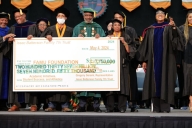You have /5 articles left.
Sign up for a free account or log in.
In a decision that could have ramifications for medical researchers, the U.S. Supreme Court ruled Thursday that isolated human genes could not be patented, though it said synthetic genes could be eligible for patents. Researchers hailed the decision, saying it brings clarity to a fast-changing area of research and opens that area up to greater investigation.
“The right to control exclusively the use of a patient’s genes could have made it more difficult to access new tests and treatments that rely on novel technologies that can quickly determine the sequence of any of the estimated 20,000 genes in the human genome,” said Francis Collins, director of the National Institutes of Health, in a statement. “Such approaches form the cornerstone of the rapidly emerging field of personalized medicine, in which diagnostic, therapeutic and preventive strategies can be tailored to each person’s unique genetic makeup.”
The case attracted attention from the higher education community, with multiple research and law groups weighing in on it at various levels. Groups such as the American Medical Association opposed the right to patent genes. The Association of University Technology Managers, a group that represents technology-transfer officers, supported the right.








